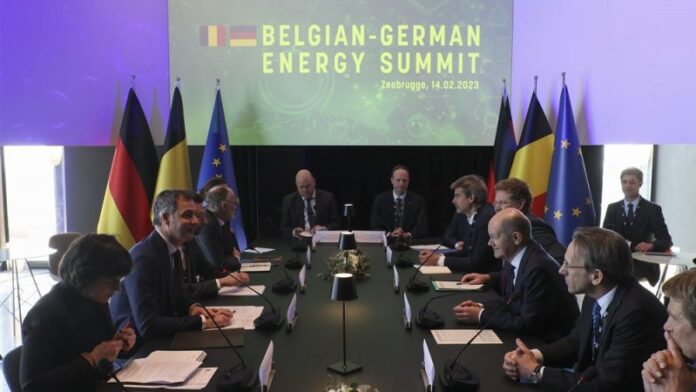Belgian and Germany agreed to link their hydrogen networks, double gas transit to Germany and conduct a study to construct a second electricity interconnector, the two states agreed at the first Belgian-German Energy Summit in Zeebrugge, according to Euractiv.
Belgian Prime minister Alexander De Croo received German Chancellor Olaf Scholz on Tuesday in Zeebrugge, where the largest LNG terminal complex in Europe is located.
The two discussed energy in the framework of the first Belgian-German Energy Summit.
Zeebrugge plays a key role in ensuring Germany’s gas supply. Before the war in Ukraine, Berlin was relying heavily on gas from Russia — unlike Belgium, which imports very little Russian gas (6.6% of its supply in 2020). Since the start of the war and the gas flow cuts, however, Germany had to seek alternatives.
Belgium’s exports to Germany changed significantly, and LNG flows from Belgium helped make up for the gas that once came through Nord Stream 1.
Until recently, Germany had no infrastructure to import liquefied natural gas (LNG). Now, it constructed LNG terminals and plans to expand its capacity by constructing permanent terminals. However, Berlin will still be relying on imports via Belgium for some time and is thus pushing to further increase gas imports from the country.
Apart from strengthening energy independence, the aim of the series of meetings was to accelerate the transition to renewable energy and secure the future of Belgian and German industries.
During a press point that followed the Summit, De Croo underlined that “it makes sense when your industries are linked that your energy infrastructure is also linked”.
De Croo also mentioned that Germany and Belgium share the common will to keep industries in Europe, adding that the leaders discussed long-term investments, which will not be sufficient to prevent them to leave Europe but are nonetheless important. According to him, access to energy, financing and innovation is also crucial to achieving this objective.
After the meetings, De Croo announced that the two countries plan to double gas transit to Germany (with work starting this year), link their hydrogen networks, and start a study for the construction of a new electricity interconnector.
Belgium and Germany currently have one energy interconnector that was constructed in 2020 — ALEGRO. At the press point, De Croo announced the creation of a second version of the ALEGRO. This new interconnector, which was anticipated, could have a capacity of 1 gigawatt HVDC and be operational as early as 2028.
“Today we put a booster on energy cooperation. Belgium is a European energy crossroads. Today for gas for Germany and tomorrow for the energy of the future: renewable energy and green hydrogen,” Belgian Energy Minister Tinne Van Der Straeten said.


